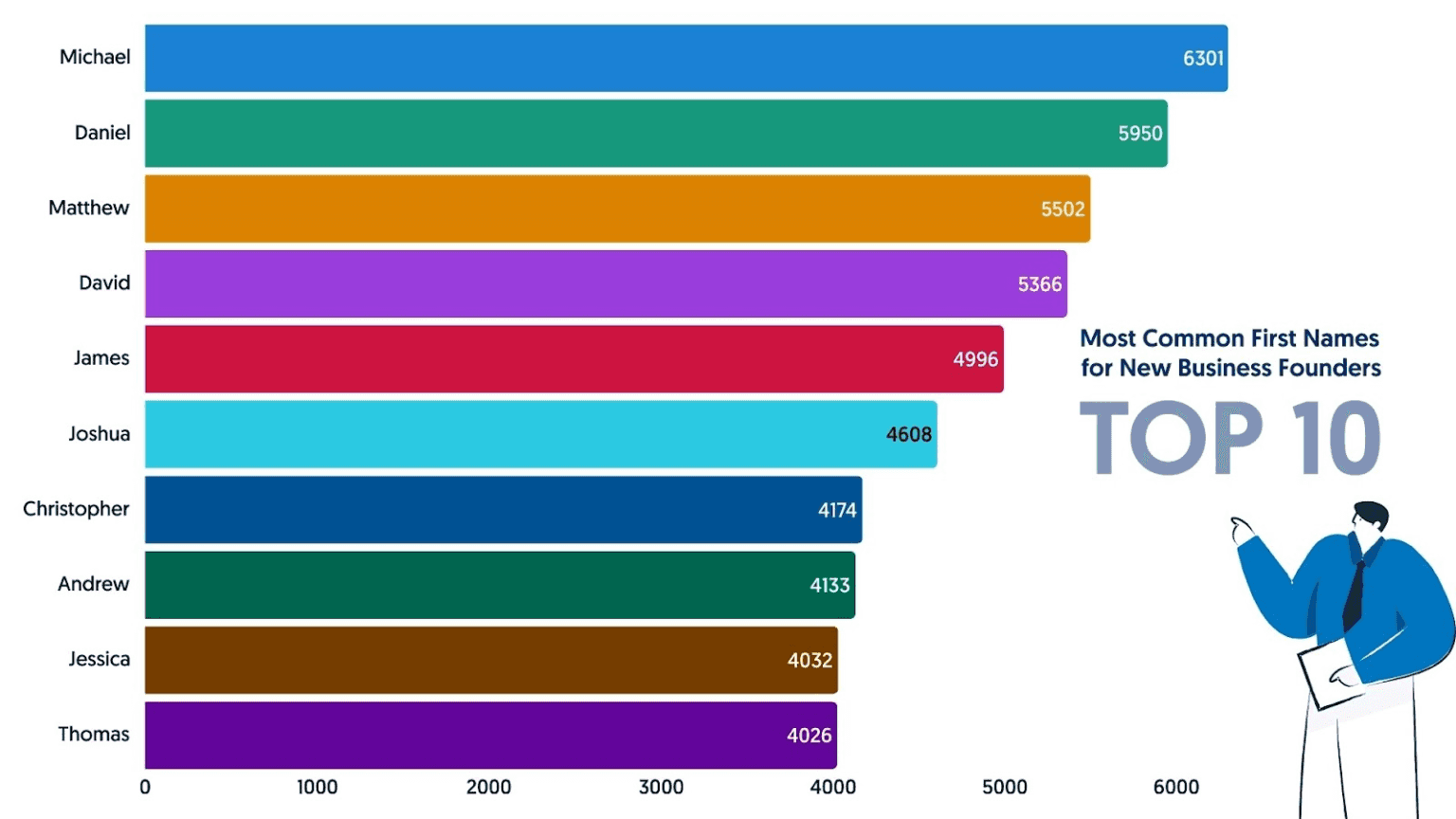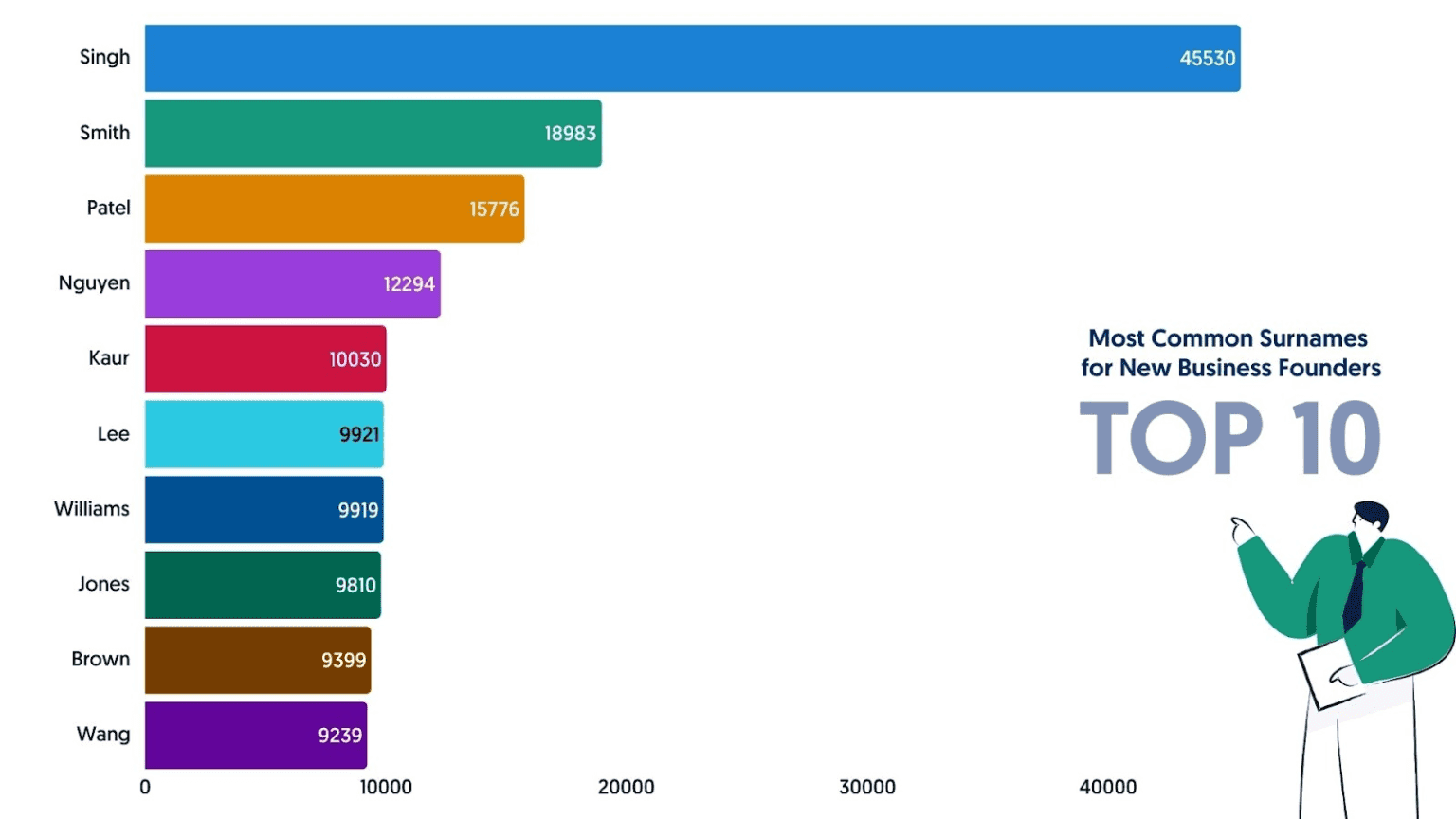What’s in a name? Said Shakespeare a long, long time ago…
Sometimes it is a family legacy. Sometimes it is a new identity, chosen in a new country. And for thousands of Australians each year, that same name is typed into government forms the day they decide to back themselves and start a business.
The Lawpath Business Index analyses millions of ABN registrations to surface the people and patterns behind Australia’s business creation. In our latest read of the data, we’ve found a clear trend. Some names consistently appear on new registrations year after year, while others are emerging for the first time in large numbers.
This is the first story in a new series powered by the Index. And it starts with a simple question: who are Australia’s most entrepreneurial names today, and what do they reveal about our economy and culture?
The top entrepreneurial names in Australia
The latest 12-month window of the Lawpath Business Index shows two names leading the charge.
The name Michael recorded 6,301 new ABN registrations between July 2024 and September 2025. In contrast, the name Sarah sits just outside the current top ten but holds 14,087 lifetime registrations, making her the highest-ranking female founder name in the Index’s history.

Does this mean being a Michael or a Sarah gives you an edge in starting a business, or are these simply the names of generations who are now at peak business-building age?
The data alone doesn’t answer that, but it does highlight patterns that go beyond coincidence.
Here are the ten most common first names for new business founders over the last 12 months
- Michael – 6,301
- Daniel – 5,950
- Matthew – 5,502
- David – 5,366
- James – 4,996
- Joshua – 4,608
- Christopher – 4,174
- Andrew – 4,133
- Jessica – 4,032
- Thomas – 4,026
Nine of the ten are traditionally male names. Jessica is the only female name in the current top tier. The long-term view shows female names appearing in the top 20 more often than in previous years.
Is this the start of a broader shift in who launches businesses in Australia, or just a blip? The next few years of the Index will tell us more.
The top entrepreneurial surnames in Australia
First names may grab attention, but surnames tell a bigger story. Looking at ABN registrations through the Lawpath Business Index, the most common family names reveal just how diverse Australia’s founder community has become.

- Singh – 45,530
- Smith – 18,983
- Patel – 15,776
- Nguyen – 12,294
- Kaur – 10,030
- Lee – 9,921
- Williams – 9,919
- Jones – 9,810
- Brown – 9,399
- Wang – 9,239
The scale is striking. Singh appears more than twice as often as Smith, a sharp reminder of how much the centre of gravity has shifted. Patel, Nguyen, Kaur, and Wang also sit high on the list, pointing to the strength of Indian and Southeast Asian founders in particular.
Still, familiar Anglo surnames remain part of the picture. Smith, Jones, Brown, and Williams continue to rank in the top ten, showing that Australia’s entrepreneurial landscape isn’t defined by one heritage alone.
Taken together, the surname data highlights a blend of legacy and migration — a business community that reflects both continuity and change.
Why do names matter?
Australia is one of the most culturally diverse countries in the world, with nearly 28% of our population born overseas according to the latest Census figures. That proportion has been steadily climbing since World War II. So when we look at the growing prevalence of non-Anglo names among business founders, it’s not a surprise; it’s a mirror of our communities in action.
We also know that behind those names are ambition and drive. Migrants own about one‑third of Australian small businesses, and 83% started their first venture after arriving here. Many of these founders are opportunity‑driven, skilled migrants who bring innovation, networks, and cultural capital to their businesses.
But it isn’t just about representation. Names can still carry friction. Studies show job applicants with non‑Anglo names receive significantly fewer callbacks—one Australian study found ethnic names got up to 57% fewer callbacks for leadership roles, and 45% fewer even for other positions, despite identical resumes. Another reported that only 5% of Chinese‑named applicants were invited to interview, compared to 13% with Anglo‑Saxon names.
That bias doesn’t stop people; it drives entrepreneurship. When the traditional doors seem closed, creating your own path becomes not just a choice but a necessity. Some even tweak or anglicise their names to avoid friction, perhaps switching to easier pronunciations or choosing a more familiar “English” name.
So what does that mean for the names we see in the Lawpath Business Index? They’re not just data points. They’re signals of resilience, adaptation, and identity. They chart a path from evolving demographics to changing norms, and they raise a question worth considering which is if Australia becomes ever more multicultural, will our entrepreneurial landscape keep broadening to reflect that, or will bias keep holding some names and people back?
The future list of entrepreneurial names
If Michael and Sarah are entrepreneurial mainstays now, which names might dominate Australia’s business landscape 10 or 20 years from today? We don’t have ABN data for the future, but we can peer into the clues left by current baby naming trends.
According to McCrindle Research’s 2025 Baby Names Report, Oliver remains the most popular name for baby boys in Australia for the 12th consecutive year, while Charlotte has reclaimed the top spot for girls. Among Generation Alpha (born 2010–2024), there are over 30,818 Olivers and 24,256 Charlottes (numbers that hint at the likely entrepreneurial heavyweights of the future).
Cooler still, several names are trending upward rapidly. Theodore, Arthur, Arlo, Muhammad, and Harvey are rising fast among boys, while Luna, Maeve, Florence, and Aria are surging in popularity among girls.
This suggests the business faces of the future may well be Arlos, Theodores, or Lunas, and it’s not hard to imagine them launching startups, consultancies, or creative ventures a few decades down the track.
There’s also a broader cultural shift at play. Many modern parents are choosing nicknames as official names, favouring friendly and punchy options like Lottie (for Charlotte), Frankie, Leo, and Billy—a trend that reflects informal, approachable branding that might echo through future business registers.
So, three quick questions to leave you with:
- Will Oliver and Charlotte stay entrepreneurial dynamos simply because there are so many of them?
- Will the rise of nicknames as names shape how businesses brand themselves?
- And as naming trends shift, will Lawpath see a new generation of Theodores, Arlos, Aria, or Lunas launching businesses and breaking new ground?
Name your ambition
Whether your name is a regular in the Index or one the nation hasn’t yet seen in lights, starting a business is about more than what’s printed on your forms. It’s about the idea, the leap, and the determination to see it through.
Every day, Australians from every background take that first step, registering a business that could change their life, or even their industry. Your name might never top a list, but your ambition can.
Lawpath has helped over 500,000 Australians start and grow their businesses with the tools, templates, and legal support to make it happen. If you’re ready to see your name on an ABN, sign up for free, and we can help you get there.







